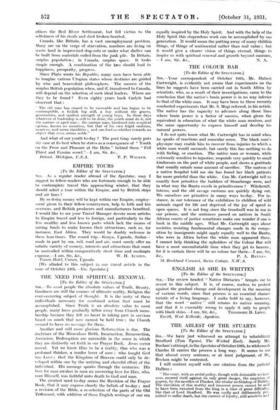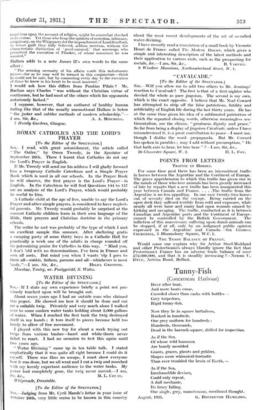THE ABLEST OF THE STUARTS
[To the Editor of the SPECTATOR.] Sta,--We have just witnessed an attempt to rehabilitate Strafford (Tom Tyrant, The Wicked Earl). Surely Mr. Buchan's attempt, in the Spectator of October 10th, to whitewash Charles II carries the process a long way. It seems to me
that almost every sentence, or at least judgement, of 31r.
Buchan might be contested. .
I will content myself with one citation from the judicial Hallam :
" The court, with an artful policy, though with detestable wicked- ness, secured itself against its only great danger, the suspicion of popery, by the sacrifice of Plunket, the titular archbishop of Dublin. The execution of this worthy and innocent person cannot be said to have been extorted from the king in a time of great difficulty, like that of Lord Strafford. He was coolly and deliberately per- mitted to suffer death; lest the current of loyalty, still sensitive amt
suspicious upon the account of religion, might be somewhat checked in its course. Yot those who heap the epithets of merciless, inhuman, sanguinary, on the Whig party for the impeachment of Lord Strafford, in whose guilt they fully believed, seldom mention, without the characteristic distinction of good-natured,' that sovereign who permitted the execution of Phuiket, of whose innocence he was assured."
Hallam adds in a note James Irs own words to the same effect :
" The seeming necessity of his affairs made this unfortunate prince—for so he may well be termed in this conjuncture—think he could not be safe, but by consenting every day to the execution of those he knew in his heart to be most innocent."
I would ask how this differs from Pontius Pilate ? Mr. Buchan says Charles " was without the Christian virtue of continence, but he had most of the others which his opponents notoriously lacked."
I suppose, hooves er, that an outburst of healthy human feeling like that of the usually unemotional Hallam is below the juster and subtler methods of modern scholarship."—







































 Previous page
Previous page